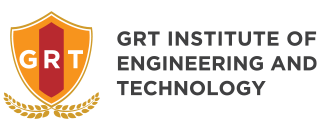Bachelor of Technology in Artificial Intelligence and Data Science is a 4-year undergraduate Engineering Degree programme. B.Tech with specialization in Artificial Intelligence & Data Science degree program has experienced an increasing demand in the Global market over the last few years. It is powered by the disruption in the use of Internet, substantial usage of smart phones, innovations in social media, online banking, etc. This course aims to bring up the budding engineers as connoisseurs in Data Science, Machine Learning, Deep Learning and other underlying fields of Artificial Intelligence.
This four-year degree programme will certainly provide a roadmap to advance the profession and career growth of the students. The leading Artificial Intelligence and Data Science colleges in GRT Institute engineering and Technology provide high-end processing systems with seamless Wi-Fi connectivity, essential software and tools for students to apply learning from theory classes to the real world and analyze their results. The bachelor’s course on Artificial Intelligence and Data Science in this Institute was started in the year of 2022 with an intake of 60 students.
Vision & Mission
Department Vision
To create high quality software engineers, academicians, researchers and entrepreneurs for creating a value-based sustainable society in the field of Artificial Intelligence and Data Science.
Department Mission
M1: Establishing a climate of academic success using the most effective teaching-learning strategies.
M2: Creating individuals with practical training and expertise to satisfy corporate demands.
M3: To improve the Students Knowledge in Data Science Education, research and Industry Collaboration in the field of AI and Data Science.
M4: To develop strong moral principles and problem-solving skills among students.
Program Educational Objectives (PEOs)
PEO1: Utilize their proficiencies in the fundamental knowledge of basic sciences, mathematics, Artificial Intelligence, data science and statistics to build systems that require management and analysis of large volumes of data.
PEO2: Design and model AI based solutions to critical problem domains in the real world.
PEO3: Exhibit innovative thoughts and creative ideas for effective contribution towards economy
building.
Programme Outcomes (POs)
PO1: Engineering knowledge: Apply the knowledge of mathematics, science, engineering fundamentals, and an engineering specialization to the solution of complex engineering problems.
PO2: Problem analysis: Identify, formulate, review research literature, and analyze complex engineering problems reaching substantiated conclusions using first principles of mathematics, natural sciences, and engineering sciences.
PO3: Design/development of solutions: Design solutions for complex engineering problems and design system components or processes that meet the specified needs with appropriate consideration for the public health and safety, and the cultural, societal, and environmental considerations.
PO4: Conduct investigations of complex problems: Use research-based knowledge and research methods including design of experiments, analysis and interpretation of data, and synthesis of the information to provide valid conclusions.
PO5: Modern tool usage: Create, select, and apply appropriate techniques, resources, and modern engineering and IT tools including prediction and modeling to complex engineering activities with an understanding of the limitations.
PO6: The engineer and society: Apply reasoning informed by the contextual knowledge to assess societal, health, safety, legal and cultural issues and the consequent responsibilities relevant to the professional engineering practice.
PO7: Environment and sustainability: Understand the impact of the professional engineering solutions in societal and environmental contexts, and demonstrate the knowledge of, and need for sustainable development.
PO8: Ethics: Apply ethical principles and commit to professional ethics and responsibilities and norms of the engineering practice.
PO9: Individual and team work: Function effectively as an individual, and as a member or leader in diverse teams, and in multidisciplinary settings.
PO10: Communication: Communicate effectively on complex engineering activities with the engineering community and with society at large, such as, being able to comprehend and write effective reports and design documentation, make effective presentations, and give and receive clear instructions.
PO11: Project management and finance: Demonstrate knowledge and understanding of the engineering and management principles and apply these to one’s own work, as a member and leader in a team, to manage projects and in multidisciplinary environments.
PO12: Life-long learning: Recognize the need for, and have the preparation and ability to engage in
independent and life-long learning in the broadest context of technological change.
Program Specific Outcome (PSOs)
PSO1: Develop data analytics and data visualization skills, skills pertaining to knowledge acquisition, knowledge representation and knowledge engineering, and hence be capable of coordinating complex projects.
PSO2: Create, select and apply the theoretical knowledge of AI and Data Analytics along with practical Industrial tools and techniques to manage and solve wicked societal problems.
PSO3: Able to carry out fundamental research to cater the critical needs of the society through cutting
edge technologies of AI.
Faculty
| S.No. | NAME OF FACULTY | Designation |
| 1 | Mr.D. ABDULKAREEM | HOD/ Asst.Professor |
| 2 | Dr.S.SATHYA | Asso.Professor |
| 3 | Mr.S.SURESH | Asst.Professor |
| 4 | Ms.V.ANTONY SIBIYA VARGHESE | Asst.Professor |
| 5 | Mrs.E.KALAIVANI | Asst.Professor |
| 6 | Ms.P.JAYALAKSHMI | Asst.Professor |
